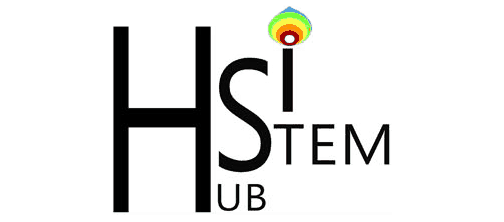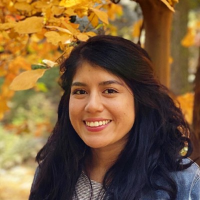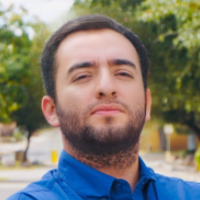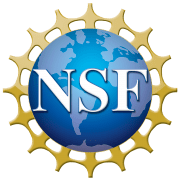STEM Pedagogy, Andragogy, & Interdisciplinary Musings
Daniel Alejandro González, New Mexico State University, HSI STEM Hub
Broad View
There are many ways to approach teaching STEM subjects. These range from hands-on experiences, to projects and labs that connect activities, to the long-established staple of reading a text. Many of the traditional approaches have adapted or given way to the expansion of communication and learning technologies. Current realities have deepened our dependence on technology to deliver coursework to students and navigate larger parts of our lives in general. Smartphones are common and almost everyone is expected to have one. Work discussions, school interactions, and socialization all intersect in online spaces. New spaces and apps are constantly made available, each feeding the new tools to the public, and filling the growing necessity and appetite for technology. Here, technology becomes an intersection as both a subject to learn and master, as well as a vehicle for learning other disciplines.
Student Track
As a learner, my exposure to most things STEM started from being a user of technology. My graduate coursework included a healthy dose of online courses. These offered digital ways to access materials, create work products, and interact with classmates. There were many tools and techniques to learn along the way. Once I arrived at a more functional digital literacy, new apps became fun, assignments became spaces for creativity, and hidden concepts more accessible.
Multiple Backgrounds Multiple Literacies
A first connection to STEM content came from an assignment in a Bicultural/Bilingual Studies course focusing on visual artists and their work. As we were studying the artists’ approaches, their communities of learning, and their expression of identity through visual art, we were directed to consider how they use STEM in their efforts. The connection was not clear to me at the time, but as the experience unraveled, it was amazing to see how chemistry and math were a vital part of their art productions. There were detailed processes for mixing materials and calculations to be made when scaling smaller sketches into building size murals.
Continuing on a path of learning about previously unseen yet complimentary connections, my doctoral studies have combined the applied approach of Curriculum & Instruction with the complexities involved in Gender & Sexuality Studies. These distinguished approaches have helped me reflect further on how STEM concepts were present in many fields, many industries, as well as across societal spaces and in my own life. We were guided towards complex realities and issues such as: How would we approach content on the medical treatment of women of color? Would it be sufficient to draw from a single field, or would the approach and understanding be served by considering various fields?
We were challenged to learn from many disciplines and combined our analysis to gain deeper understanding.
Teaching and Preparing
As a college instructor, I lean towards groupings of videos, memes, and images. Since students have varied backgrounds, the intention is to find ways to reach them and connect to their experiences. Different types of materials intended to make the class interesting and embrace different learning preferences. There were many ways to curate materials and moving between mediums offered multiple access points and perspectives on course concepts. Emphasizing different materials allows students to choose from different mediums and another way to enter from their personal experiences. Students may have considered themselves distant from certain fields but having them create materials themselves added to their awareness and interactions with subject matter. The emphasis was on creating a learning dialogue and charged students with sharing their perspectives on connections that I could not see or share myself. Students’ work contributions and performances inspired aha! moments, insightful questions, and a richness to our learning community and dialogue.
Be a Part of the Discussion
What curious interdisciplinary connections can you see in STEM?
Which ones would you use in your courses?
Excited to hear your insights and perspectives. Jump on to our STEM Pedagogy/Andragogy twitter page and tell us there: https://twitter.com/HsistemE/status/1384133908980060160
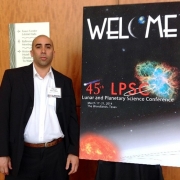
Daniel is a doctoral student and ethnographic filmmaker at New Mexico State University. Academic works include an edited volume on multicultural children’s literature, book chapter on identity and consciousness in pedagogy, and research on social movements in Latino communities. Daniel has consulted with NASA to improve collaborations with Latino communities and NATO on institutional and intercultural conflict. His research examines ethnic and cultural identity in teacher development, pedagogy, critical studies, visual arts production and representation, and digital communities of practice. He serves on the editorial board of the Bilingual Review/Revista Bilingüe and has been a Senior Editor on the Harvard Journal of Hispanic Policy. I co-produced series on Art, STEM, and Identity. These parts speak directly to work we’re doing with the Hub.
El Paso Community College-Rising to the Challenge
Dr. Maria Alvarez, Biology Professor and Faculty Coordinator, Rise to the Challenge Bridge Program Director, El Paso Community College
When I started teaching at El Paso Community College (EPCC) in 1994, I was convinced that getting students to work on research projects with relevance to our community and exposing them to the investigative nature of science was the best way to get them excited about science, motivating them to stay in school and graduate with STEM degrees. At the time, the institution did not have any research laboratory facilities. Despite the lack of infrastructure, I was able to get a small group of students to conduct research projects dealing with water quality in the Colonias of the US-Mexico Border.
After participation in a Quality Education for Minorities Network grant writing workshop in Washington, DC, we applied for an NSF research facilities renovation grant. Although the first application was not funded, we followed the advice of the NSF program officer and submitted two additional applications. Those were funded. An empty classroom was turned into a fully equipped state-of-the-art research facility for students, which was inaugurated in1997.
A year later, I was selected to participate in the Extramural Associates program at NIH. The program provided training for faculty at non-research-intensive institutions to become familiar with funding mechanisms at NIH and other federal agencies. In April 2000, EPCC joined four-year universities as a recipient of the Research Initiative for Scientific Enhancement (RISE) program grant, which we called RISE to the Challenge. We were funded on the first trial, at the level of $500,000 per year for 4 years. Our goal was to increase the participation of students and faculty in biomedical research and promote student success through mentoring and Supplemental Instruction (SI). The RISE program provided funding for paid research internships for 15 EPCC students per year, an essential requirement to keep students employed on campus and focused on academics. The program was competitively renewed three times maintaining that level of funding for 17 years. In addition to 230 RISE research interns, the program has employed hundreds of former EPCC graduates, working as tutors or SI facilitators.
Due to program restructuring at NIH, our program transitioned into our currently funded Bridges to the Baccalaureate program. The new RISE Bridge program increases the number of students impacted by taking the research experience to the classroom through Course-based undergraduate research experiences (CUREs) in Biology and Chemistry courses. To date, 10,500 EPCC students enrolled in biology, chemistry and mathematics courses have benefitted from SI and/or CURE participation. Our data clearly show that SI student participants outperform non-participants in course grades and retention. CURE participants show significant gains in developing scientific identity and research skills.
RISE/Bridge students have presented their research projects at scientific conferences every year, bringing home at least one national award every year. Even during the pandemic, we received four awards! Our students have published their work in peer-reviewed scientific journals; gone on to successfully complete Master’s and PhD degrees; and become faculty and role models to underrepresented students. With an 85% Hispanic and economically disadvantaged student population, EPCC is making significant contributions in the education of underrepresented students in STEM.
Student awards links:
EPCC RISE Students Win Three Awards at ABRCMS Conference
*Colonias- an unincorporated settlement (as of Mexican-Americans or Mexicans) in the U.S. usually near the Mexican border that typically has poor services and squalid conditions. https://www.merriam-webster.com/dictionary/colonia
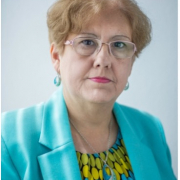 Dr. Maria Alvarez is a Biology Professor and Faculty Coordinator at El Paso Community College (EPCC). She received her B.S. and M.S. degrees in Biology from UTEP and her PhD from NMSU. She has over twenty five years of teaching experience, and as a faculty member at a Hispanic Serving Institution, she has learned to identify the needs of the multicultural student population in the US-Mexico Border region. Dr. Alvarez has been a mentor of hundreds of minority and disadvantaged students. She is an environmental microbiologist and her research on virus inactivation, and characterization of antibiotic resistant bacteria has received funding from the EPA, NSF, and private foundations. In addition to several publications with student co-authors, her work has resulted in 70 student presentations at the Annual Biomedical Conference for Minority Students, the Society for the Advancement of Chicano and Native American Scientists, and the American Society for Microbiology. Dr. Alvarez is the Director and founder of EPCC’s Research Initiative for Scientific Enhancement (RISE) Program from NIH since April 2000. The RISE Program transitioned into the Rise to the Challenge Bridge Program to continue providing minority and disadvantaged students with the necessary tools to succeed in college, transfer to a four-year university and pursue a biomedical research career and a Ph.D. Her efforts resulted in additional funding from the U.S. Department of Education, Department of Homeland Security, and the NIH BUILD program to expand research training to Early College High School Students. Dr. Alvarez has served in national committees dealing with educational issues at ASM, AAAS, NIH-NHGRI, and HACU. She has been honored by Minority Access, SACNAS, the YWCA, and recently received the 2019 McDonald’s Hispanos Triunfadores Award and the 2018 ACCT William H. Meardy Faculty Member National Award for her efforts in STEM Education. She is the founder and faculty advisor of EPCC’s Art and Science Student Club, which has sponsored summer camps and the annual Art and Science Research Symposium where students from EPCC, UTEP and NMSU have presented their work
Dr. Maria Alvarez is a Biology Professor and Faculty Coordinator at El Paso Community College (EPCC). She received her B.S. and M.S. degrees in Biology from UTEP and her PhD from NMSU. She has over twenty five years of teaching experience, and as a faculty member at a Hispanic Serving Institution, she has learned to identify the needs of the multicultural student population in the US-Mexico Border region. Dr. Alvarez has been a mentor of hundreds of minority and disadvantaged students. She is an environmental microbiologist and her research on virus inactivation, and characterization of antibiotic resistant bacteria has received funding from the EPA, NSF, and private foundations. In addition to several publications with student co-authors, her work has resulted in 70 student presentations at the Annual Biomedical Conference for Minority Students, the Society for the Advancement of Chicano and Native American Scientists, and the American Society for Microbiology. Dr. Alvarez is the Director and founder of EPCC’s Research Initiative for Scientific Enhancement (RISE) Program from NIH since April 2000. The RISE Program transitioned into the Rise to the Challenge Bridge Program to continue providing minority and disadvantaged students with the necessary tools to succeed in college, transfer to a four-year university and pursue a biomedical research career and a Ph.D. Her efforts resulted in additional funding from the U.S. Department of Education, Department of Homeland Security, and the NIH BUILD program to expand research training to Early College High School Students. Dr. Alvarez has served in national committees dealing with educational issues at ASM, AAAS, NIH-NHGRI, and HACU. She has been honored by Minority Access, SACNAS, the YWCA, and recently received the 2019 McDonald’s Hispanos Triunfadores Award and the 2018 ACCT William H. Meardy Faculty Member National Award for her efforts in STEM Education. She is the founder and faculty advisor of EPCC’s Art and Science Student Club, which has sponsored summer camps and the annual Art and Science Research Symposium where students from EPCC, UTEP and NMSU have presented their work
May 11th -18th: Participate in the 7h Annual STEM for All Video Showcase Event: COVID, Equity & Social Justice, funded by the National Science Foundation.
Joni Falk, STEM for All
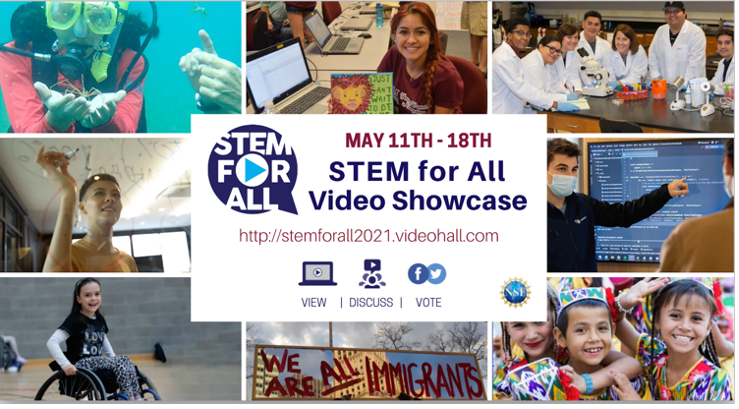
Researchers, practitioners, policy makers, informal educators, and parents interested in enhancing STEM education are invited to take part in a free, interactive, 8-day, video showcase event, showcasing federally funded projects to improve STEM and computer science education. All are welcome to view, discuss, and vote for favorites from May 11th-18th.
The online event, https://stemforall2021.videohall.com/, provides an opportunity to hear how programs across the nation have addressed the challenges posed by COVID and related school closures, particularly in underserved communities. Over 1,100 presenters and co-presenters have come together to share 287 3-minute videos. More than half of the presentations address racial or gender inequities, and provide strategies to broaden participation and quality experiences for students of all ages, from the youngest elementary students to those pursuing graduate degrees. Collectively they provide a comprehensive introduction to the creative work being done across the nation to improve STEM education in both formal and informal environments.
There are 46 presentations created by presenters and co-presenters from HSI institutions. This rich collection addresses workforce development, increasing Hispanic representation in STEM and computer science fields, improving teaching and learning in K-12 and in higher education settings, teacher preparation and professional development programs, mentoring, and informal learning experiences.
Visitors to the site can filter the presentations by grade level, organization, state, keywords, or audience type to find those of greatest interest. In addition to discussing the videos, all visitors can vote for their favorite presentations. At the end of the event, presentations that received the most votes will be identified as “Public Choice” winners.
While we have all attended many online events this past year, this one stands out in terms of its depth, breadth, and opportunities to interact with the presenters and other visitors from across the globe. Your participation is invited! While the event ends of May 18th, all videos will remain accessible to the public. After May 18th, discussions will continue on the STEM for All Multiplex.
Most of the projects presented are funded by the National Science Foundation, but there are also presentations from projects funded by 8 other federal agencies, including ED, NASA, NIH, NOAA, IMLS, US Dept. of State, ONR, and USDA.
The STEM for All Video Showcase is hosted by TERC, in partnership with: STEMTLnet, CADRE, CAISE, CIRCLS, STELAR, CS for All Teachers, NARST, NCTM, NSTA, NSF INCLUDES, and QEM. The Showcase is funded by a grant from the National Science Foundation (#1922641).
To learn more about the Showcase and to watch the project videos, visit http://stemforall2021.videohall.com
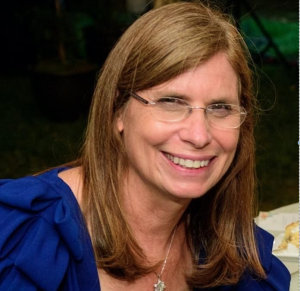 Joni co-directs the Center for School Reform at TERC, a nonprofit research and development institution aimed at improving mathematics and science teaching and learning. The Center has multiple projects researching the teaching and learning of STEM, creating and facilitating electronic communities, developing new science curricula, and implementing teacher development programs. She has created of multiple communities of practice and collegial networks to facilitate knowledge sharing across multiple communities. Currently, Joni is the Principal Investigator of the STEM Teacher Leadership Network (STEMTLnet.org), the STEM for All Video Showcase (stemforall2020.videohall.com) and the STEM for All Multiplex (Multiplex.videohall.com) all funded by the National Science Foundation.
Joni co-directs the Center for School Reform at TERC, a nonprofit research and development institution aimed at improving mathematics and science teaching and learning. The Center has multiple projects researching the teaching and learning of STEM, creating and facilitating electronic communities, developing new science curricula, and implementing teacher development programs. She has created of multiple communities of practice and collegial networks to facilitate knowledge sharing across multiple communities. Currently, Joni is the Principal Investigator of the STEM Teacher Leadership Network (STEMTLnet.org), the STEM for All Video Showcase (stemforall2020.videohall.com) and the STEM for All Multiplex (Multiplex.videohall.com) all funded by the National Science Foundation.
Thank you for being part of our community
Nicolas Mendez, New Mexico State University, Las Cruces, NM
During the last year, we have been connecting with you through our social networks:
Twitter @HSISTEMHub
LinkedIn HSI-STEM Hub
These platforms are meant to reach the HSI STEM community of practice and help create connections within our diverse network of professionals from different disciplines, institutions, and associations that support diverse populations in STEM across the U.S. We use these platforms to share important information about trainings, workshops, webinars, podcasts, certification series, and other resources for the community of practice. STEM educators, researchers, and administrators engage in trainings offered by the HSI STEM HUB for grant writing, teaching, and multicultural awareness aiming to achieve the goal of improving student success.
We want to thank you for being part of this growing community and we ask that you help us spread the word, by sharing/reposting our events and information for your connections and communities to engage with this initiative. We will continue to build a stronger and more diverse network to diversify the STEM enterprise.
Follow our new HSI STEM Hub account:
Twitter @HsistemE
This account is dedicated to STEM Pedagogy resources, discussions, and news by the HSI STEM Community! Here you can share best practices for the STEM classroom with the Hub and members of many institutions across the U.S.
Gracias por ser parte de nuestra comunidad
En el ultimo año, nos conectamos con ustedes en nuestras redes sociales:
Twitter: @HSISTEMHub
LinkedIn: HSI-STEM Hub
Buscamos de conectar con profesionales de diferentes áreas en HSI´s y otras instituciones y asociaciones que ayudan a minorías a lo largo de los EEUU. En esta búsqueda, conectamos con mas de 2000 usuarios, incrementando la red profesional en el país, brindando información importante acerca de talleres, webinars, series certificadoras y distintos eventos que ayudan educadores e investigadores a expandir sus habilidades en aplicación a grants y apuntando a nuestro objetivo de mejorar el éxito estudiantil.
Por todo este queremos agradecerte por ser parte de esta comunidad que crece cada día mas y queremos pedirte que divulgues nuestros eventos y nuestra información a las mayria de personas que creas interesadas en nuestra iniciativa y que sigamos construyendo una red mas fuerte y diversa que será exitosa con tu ayuda.
También queremos compartir nuestra nueva cuenta asociada:
Twitter @HsistemE
la cual puedes seguir en Twitter, dedicada en publicar recursos pedagógicos en STEM, debates, y noticias de la comunidad HSI. Aquí podrás tener una charla mas interactiva con miembros de nuestro equipo y colaboradores de distintas instituciones HSI a lo largo de EEUU.
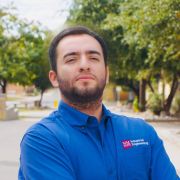 Nicolas Mendez is a Master’s student in Industrial Engineering. He is from Bogota, Colombia, and completed his Bachelor’s degree at La Salle University in 2018. During his professional career, he has worked in the pharmaceutical industry performing quality control, process analysis, and cost evaluations. He is a member of the Recruitment Team for the Department of Industrial Engineering at New Mexico State University, working with middle and high school students to pursue a career in engineering.
Nicolas Mendez is a Master’s student in Industrial Engineering. He is from Bogota, Colombia, and completed his Bachelor’s degree at La Salle University in 2018. During his professional career, he has worked in the pharmaceutical industry performing quality control, process analysis, and cost evaluations. He is a member of the Recruitment Team for the Department of Industrial Engineering at New Mexico State University, working with middle and high school students to pursue a career in engineering.
Engagement and Inclusion Matter to All of Us
Dr. Margie Vela, New Mexico State University/Doña Ana Community College, Las Cruces, NM
We all take an employee climate survey at least every other year. We spend time answering questions that sometimes seem unimportant, and then wonder what happens with the data we just spent an hour of our life submitting to our Human Resource Office. We wonder if any of this makes a difference and how why we should complete this anyway. Most of our organizations are becoming more familiar with these data and many are beginning to make data informed decisions for major and minor changes to our processes and systems- at times using the data to understand some of the most important phenomena for diversity, equity, and inclusion.
One of the most important factors assessed by workplace climate surveys is employee engagement. This factor means different things to different key players. To anyone managing an entity (institution, college, department, lab, etc.), engagement is an indicator for productivity because people who are more engaged with their work are much more productive than those who check boxes. Engagement is also an indicator for employee retention, which is important to an institution, as onboarding a new employee is often the most expensive investment an organization makes in the organization/employee relationship- as research scientists, I am sure you can relate.
Engagement on climate surveys is measured by three factors: 1) Psychological Meaningfulness, 2) Psychological Safety, and 3) Psychological Availability. These three factors also tell us how well we are preforming for inclusion. There are questions that we often need answered to characterize our engagement, equity, and inclusion. We can replace the word “workgroup” below with institution, college, department, lab, discipline, etc.
Psychological Meaningfulness:
Characterizing our Roles: Does my contribution to this workgroup make a difference? Is my time being spent on things I care about? Is my contribution and role valued? Is my contribution critical to the success of this workgroup? Does this workspace give me an opportunity to grow in my profession? Do I feel fulfilled by the work I do?
Equity and Inclusion: Is my contribution considered important for my own professional success? Am I able to use my strengths to make a meaningful contribution in this role? Am I given an opportunity to grow in my current role? Am I being asked to contribute meaningful work to my workgroup/discipline? Am I challenged (in a healthy and meaningful way) by the work I am being asked to complete/engage? Am I given an opportunity to make a substantial contribution to this workgroup? And is my contribution considered as valuable and important to the workgroup’s success? Am I recognized for my contributions?
Psychological Safety:
Characterizing our Roles: Can I bring my authentic self to work every day? Am I given the space and support I need to contribute to this team in a meaningful way? Can I share my ideas and thoughts in a professional way without retaliation? Do I feel supported to complete my work?
Equity and Inclusion: Can I bring my full authentic self to work every day? Am I valued at this “table”? Are my thoughts and ideas considered in the same way as everyone else at this table? Can I share my best and worst ideas with this team during brainstorming sessions without retaliation or being diminished or ridiculed? Is my lived experience and who I am welcomed in this workspace? Do others in the workgroup appreciate my lived experience?
Psychological Availability:
Characterizing our Roles: Do I have the mental space available to do my work? Am I supported in my role, so that I focus on work rather than on personal/professional interactions at work? Do I have the time to complete everything that is asked of me in a professional manner? Am I overtasked? Am I asked to do things outside of my training without support? Am I given access to the information I need to complete my work duties? Do I work in an environment that gives me the space/support I need to focus on my work? Am I given the mental and emotional space I need to make substantial contributions that will help advance my career?
Equity and Inclusion: Am I (Are people like me) expected to do things that others are not based on race/gender/age? Am I given reasonable time to complete the duties/tasks assigned to me? Am I expected to “check out” of the effects of social and political ongoings when I enter my workspace? Am I supported in a way that considers my whole authentic self at work? Is my mental health a priority for my supervisor? Do I have the support I need to make substantial contributions that will help advance my career?
As leaders in our respective spaces, we hire people who are well positioned to make contributions in different ways than we can. We focus on bringing people together who are great at making contributions in areas that we need to strengthen for the success of our teams. We help them understand our vision as leaders and support their efforts to make this vision a reality. We focus on developing trust and engagement on the team and allow people to do what we hired them to do. The more we engage our teams, the closer we get to the vision we have for our life’s work. Creating a workspace that promotes psychological meaningfulness, safety and availability improves inclusivity, trust, engagement, and productivity.
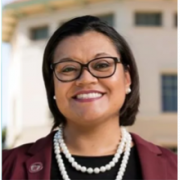 Dr. Margie Vela is the Senior Program Manager at the NSF HIS National STEM Resource Hub at New Mexico State University. She served NMSU as Student Regent from 2017-2019 and is a USDA NIFA Fellow as the PI of the Water and People Project.
Dr. Margie Vela is the Senior Program Manager at the NSF HIS National STEM Resource Hub at New Mexico State University. She served NMSU as Student Regent from 2017-2019 and is a USDA NIFA Fellow as the PI of the Water and People Project.
2021 Summer STEM Workshop Series
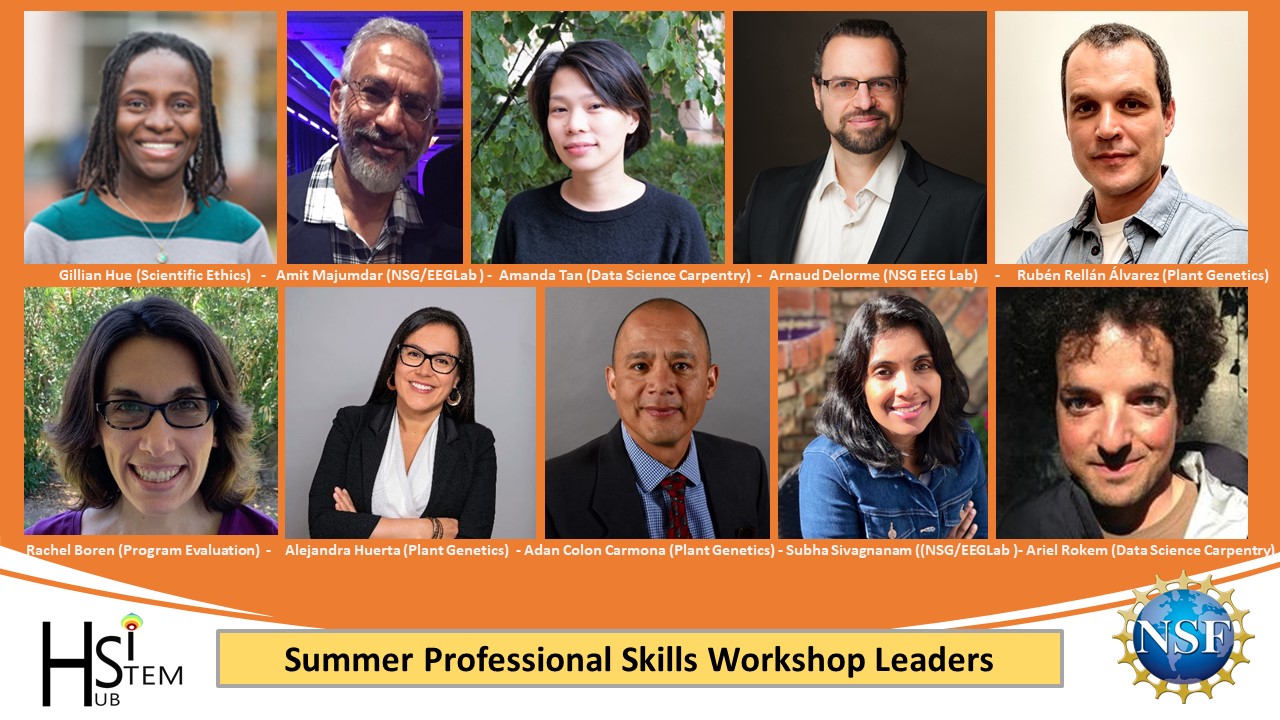
For more information:
https://hsistemhub.org/2021-summer-stemed-workshops/
Program Evaluation for Grants
Rachel Boren, NMSU
Acquire insight about the most critical components of program evaluation that you need to know as you develop your grant applications. Take your knowledge up a notch by applying these components to your projects as we work through the topics and take the time to develop your own logic models, craft clear research objectives, and more!
05/14/21 (9AM PDT- 2 pm PDT)
Early admission apply by date: April 30
06/03/21 (9AM PDT- 2 pm PDT)
Repeat of May 14. Early admission apply by date: May 14
Including Ethics in Research Experiences and Science Courses
Gillian Hue, Emory Center for Ethics
This workshop will provide faculty with student-centered pedagogical approaches to incorporating ethics into science education.
05/27/21 (9AM PDT- 2 pm PDT)
Early admission apply by date: May 14
06/18/21 (9 am PDT- 2 pm PDT)
Repeat of May 27. Early admission apply by date: May 14
Neuroscience Gateway and Electroencephalography Data Analysis for the Classroom
UCSD Team: Amit Mujamdar, Arnaud Delorme, Subhashini Sivagnanam, Kenneth Yoshimoto
This hands-on workshop will describe the Neuroscience Gateway (NSG) including the neuroscience modeling and data processing software it provides on supercomputing resources. The second part of the workshop will introduce electroencephalography (EEG) as an electrophysiological monitoring method to record electrical activity of the brain and show how to collect and process EEG data using the EEGLAB software in undergraduate courses.
06/02/21 (9AM PDT- 2 pm PDT)
Early admission apply by date: May 14
Data Science Training and Collaboration
Ariel Rokem, University of Washington &
eScience/West Big Data Innovation Hub Team
An interactive workshop about tools methods and ideas for incorporating data science into instruction at all levels.
6/7/2021 -06/10/2021 (4 day workshop/11 PDT- 2 pm PDT)
Early admission apply by date: May 14
Adan Colon-Carmona (UMass Boston)
Alejandra Huerta (NCState)
Rubén Rellán-Álvarez (NCState)
This hands-on workshop will focus on modern genomics and genetic approaches to studying biological processes in plants. The workshop will draw on examples from Arabidopsis, rice and maize that can easily be incorporated into the classroom or for outreach activities.
6/24/2021-6/25/2021 (2 day workshop/ 9 PDT – 1 pm PDT) Early admission apply by date : May 14
Workshop Applications:
https://www.surveymonkey.com/r/hsihub-2021STEMwkshops
Follow The HSI STEM Hub on social media!
Twitter General: @HSISTEMHub
Twitter STEM Education: @HsistemE
LinkedIn: HSI-STEM Hub
HSI STEM Hub News
Grantsmanship Trainings Now Available
Preflight Grant Writer’s Certification Series
Join experienced grant writers as you learn to navigate the grant world. This training is recommended for first-time grant writers at any stage in their career (postdocs welcome) as you begin formulating ideas and planning for writing your first grant.
Preflight Panelists are:
Paul Gutierrez, Ph.D., Over 30 years of experience with Extension, at three Land Grant Universities—including 12 years Extension Administration and 18 years Extension Faculty/ Specialist. Dr. Gutierrez served as Vice Provost for NMSU University Outreach and Engagement, and Associate Dean and Associate Director of NMSU Cooperative Extension.
Melissa A Harrington, Ph.D., Director of the NIH-funded
Delaware Center for Neuroscience Research, an NIH-funded, virtual center linking neuroscientists at DSU and the UDel. Her research program in neurophysiology has been continuously funded by grants from the National Science Foundation, the National Institutes of Health, and the Department of Defense since 1998.
Jon Juarez, HSI STEM Hub Co-PI, NMSU Regents Professor and Chair of the Computer Information and Technology Department at DACC. He has authored eight database application textbooks published by McGraw-Hill. He serves as co-chair of the New Mexico Collegiate Business Articulation Consortium, board member of the New Mexico Association for Career and Technical Education.
Margie Vela, Ph.D. Her contributions to broadening participation of underrepresented groups in STEM include serving DSU as Assistant Director for the SMILE Program; performing analysis on broader impacts as a NSF Summer Scholar; and serving Child, Youth, and School Services for Fort Lee, Virginia as the Project Director for the HIRED! Program.
**You should complete this series at least 6 months before your submissions deadline.
Click Here for More Information
The NSF HSI National STEM Resource Hub will host the Jumpstart Grant Writer’s Webinar 2021 Spring Series:
Friday, June 4, 3 PM EST, Responding to NSF Reviews
Erika Tatiana Camacho, National Science Foundation, HSI Program Officer
Sonja Montas-Hunter, National Science Foundation, HSI Program Officer
Register on Zoom: https://us02web.zoom.us/webinar/register/WN_l_XuQnX2QnOJ0wgePzpu0Q
The HSI STEM Researchers, Educators, Professionals, and Scholars Network- You can join the network, free of charge, with your .edu, .gov, or .org email address.
Membership offers a variety of opportunities including:
• Monthly
• Hub announcements
• Community Board
• Member directory with over 700 network members working in STEM in higher education
• Access to potential collaborators across the country
• Access to on-demand training
• Access to resources and materials
The Network is a community of practice providing a unique space for HSI STEM educators to connect and engage in networking, training, resource sharing, collaborative research in a supportive academic environment. This community of practice is central to the Hub’s mission. We need your participation to create a supportive community that works together for successfully training the generation of scientists, technologists, engineers, and mathematicians at HSIs.
HSI Network Membership:
https://hsistemhub.org/join/
STEMversity the Podcast hosted by President Monica Torres – Guest panelist Dr. Bernadette Connors from Dominican College
https://hsistemhub.org/podcast/
Now Available: HSI STEM Community Board
Post and view posts for research, STEM pedagogy, conference opportunities and more!
The HSI STEM Community Board is the place to share important information with HSI STEM Professionals Network Members. Join the Network and start posting!
Community Forums:
Communication from HSI STEM Hub Leadership
COVID-19
Future Topics
Grant Writing
Institutional Capacity
Meetings/Conferences
Multicultural Awareness
Network
Research Opportunities
STEM Career Opportunities for Faculty and Staff
STEM Opportunities for Students
STEM Pedagogy
Newsletter Editors
MARGIE VELA
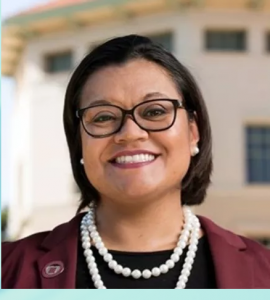 Margie Vela is a researcher, educator and public servant devoted to diversity, equity and inclusion (DEI) in higher education and STEM. She earned her Ph.D. in Water Science and Management from New Mexico State University (NMSU) in 2019 and served the State of New Mexico in public service as a Regent for the NMSU System from 2017-2019. She served as an intern at the National Science Foundation in 2015 and as a Farmer-to-Farmer USAID volunteer in 2018. Her career in DEI began at Fort Lee Garrison, where she served as Director for the HIRED! Program to prepare dependents of military personnel to enter college or the workforce. Her career in higher education began at a Historically Black University, in 2010, where she implemented a multi-million-dollar program focused on diversifying the STEM enterprise. Currently, Dr. Vela serves as Senior Project Manager for the NSF HSI National STEM Resource Hub working to implement a project aimed to bolster STEM at 539 Hispanic Serving Institutions in grantsmanship, multicultural awareness, institutional capacity building and STEM pedagogy: and facilitating partnerships across institutions and disciplines. Dr. Vela serves the NMSU Society for the Advancement of Chicanos/Hispanics and Native Americans in Science (SACNAS) Chapter as founding co-advisor and has served as a national panelist for SACNAS in DEI training as an alumnus of SACNAS Postdoctoral Leadership Institute. She recently earned a Certificate in DEI from Cornell University.
Margie Vela is a researcher, educator and public servant devoted to diversity, equity and inclusion (DEI) in higher education and STEM. She earned her Ph.D. in Water Science and Management from New Mexico State University (NMSU) in 2019 and served the State of New Mexico in public service as a Regent for the NMSU System from 2017-2019. She served as an intern at the National Science Foundation in 2015 and as a Farmer-to-Farmer USAID volunteer in 2018. Her career in DEI began at Fort Lee Garrison, where she served as Director for the HIRED! Program to prepare dependents of military personnel to enter college or the workforce. Her career in higher education began at a Historically Black University, in 2010, where she implemented a multi-million-dollar program focused on diversifying the STEM enterprise. Currently, Dr. Vela serves as Senior Project Manager for the NSF HSI National STEM Resource Hub working to implement a project aimed to bolster STEM at 539 Hispanic Serving Institutions in grantsmanship, multicultural awareness, institutional capacity building and STEM pedagogy: and facilitating partnerships across institutions and disciplines. Dr. Vela serves the NMSU Society for the Advancement of Chicanos/Hispanics and Native Americans in Science (SACNAS) Chapter as founding co-advisor and has served as a national panelist for SACNAS in DEI training as an alumnus of SACNAS Postdoctoral Leadership Institute. She recently earned a Certificate in DEI from Cornell University.
